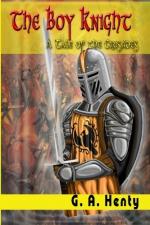It was one of the features of this war that however thorough the victories of the Christians, the Saracens very speedily recovered from their effects. A Christian defeat was crushing and entire; the knights died as they stood, and defeat meant annihilation. Upon the other hand, the Saracens and Bedouins, when they felt that their efforts to win the battle were unsuccessful, felt no shame or humiliation in scattering like sheep. On their fleet horses and in their light attire they could easily distance the Christians, who never, indeed, dreamed of pursuing them. The day after the fight the enemy would collect again under their chiefs, and be as ready as before to renew their harassing warfare.
On his return from the field the king assembled many of his principal knights and leaders, and summoned the Earl of Evesham, with the message that he was to bring his esquire with him. When they reached the tent the king said:
“My lords, as some of you may be aware, I have this day had a narrow escape from death. Separated from you in the battle, and attended only by my standard-bearer, I was surrounded by the Saracens. I should doubtless have cleft my way through the infidel dogs, but a foul peasant stabbed my charger from below, and the poor brute fell with me. My standard-bearer was killed, and in another moment my nephew Arthur would have been your king, had it not been that my good lord here, attended by this brave lad, appeared. I have seen a good deal of fighting, but never did I see a braver stand than they made above my body. The Earl of Evesham, as you all know, is one of my bravest knights, and to him I can simply say, ‘Thanks; King Richard does not forget a benefit like this.’ But such aid as I might well look for from so stout a knight as the Earl of Evesham I could hardly have expected on the part of a mere boy like this. It is not the first time that I have been under a debt of gratitude to him; for it was his watchfulness and bravery which saved Queen Berengaria from being carried off by the French in Sicily. I deemed him too young then for the order of knighthood—although, indeed, bravery has no age; still for a private benefit, and that performed against allies, in name at least, I did not wish so far to fly in the face of usage as to make him a knight. I promised him then, however, that the first time he distinguished himself against the infidel he should win his spurs. I think that you will agree with me, my lords, that he has done so. Not only did he stand over me, and with great bravery defend Sir Walter from attacks from behind, but his ready wit saved me when even his sword and that of Sir Walter would have failed to do so. Penned down under poor Robin I was powerless to move until our young esquire, in an interval of slashing at his assailants, found time to give a sharp blow together with a shout to Robin. The poor beast tried to rise, and the movement, short as it was, enabled me to draw my leg from under him, and then with my mace I was enabled to make a stand until you arrived at my side. I think, my lords, that you will agree with me that Cuthbert, the son of Sir William de Lance, is fit for the honor of knighthood.”




